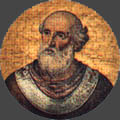 Honorius had died in October 658, Severinus, a Roman, had been elected
almost at once, but the Emperor Heraclius refused to confirm the election.
Instead of a confirmation he sent Severinus a formula of faith--a heretical
formula of faith. Heraclius, like so many other Byzantine emperors, had
taken to dogmatizing. And an emperor amidst dogmas is like the bull in the
china shop or at the very least, Saul among the prophets. Since the
Monophysite heresy had been a source of great weakness to the Eastern
Empire, Heraclius grasped eagerly at any chance to put an end to it. Now
the compromise formula of one will in Christ had appealed forcibly to
practical men who longed for reunion. Even Pope Honorius had been less than
careful in this matter. Consequently when Sergius, the patriarch of
Constantinople drew up a compromise formula called the Ecthisis, Heraclius
adopted it and ordered all to subscribe. Now this Ecthisis--the Greek word
means exposition (of the faith)--was downright heretical. It held that
there is only one will in Christ. This doctrine is called monothelite from
the Greek words meaning one will. It is open to the same objections as the
Monophysite heresy itself. If Christ had no human will, He would not be
true man.
Honorius had died in October 658, Severinus, a Roman, had been elected
almost at once, but the Emperor Heraclius refused to confirm the election.
Instead of a confirmation he sent Severinus a formula of faith--a heretical
formula of faith. Heraclius, like so many other Byzantine emperors, had
taken to dogmatizing. And an emperor amidst dogmas is like the bull in the
china shop or at the very least, Saul among the prophets. Since the
Monophysite heresy had been a source of great weakness to the Eastern
Empire, Heraclius grasped eagerly at any chance to put an end to it. Now
the compromise formula of one will in Christ had appealed forcibly to
practical men who longed for reunion. Even Pope Honorius had been less than
careful in this matter. Consequently when Sergius, the patriarch of
Constantinople drew up a compromise formula called the Ecthisis, Heraclius
adopted it and ordered all to subscribe. Now this Ecthisis--the Greek word
means exposition (of the faith)--was downright heretical. It held that
there is only one will in Christ. This doctrine is called monothelite from
the Greek words meaning one will. It is open to the same objections as the
Monophysite heresy itself. If Christ had no human will, He would not be
true man.
The imperial officials in Italy put pressure on the pope-elect to sign this
heretical formula. The exarch Isaac sent a representative to Rome who
plundered the Lateran Palace. But Pope Severinus meekly waited out the
storm. He had sent ambassadors to Constantinople to win the imperial
confirmation from Heraclius. The task was difficult, for the emperor was
determined to force his pet formula on the Pope, and of course, Severinus
could not possibly sign it. At last the Emperor gave way before the
firmness and tact of the ambassadors. After over a year and a half,
Severinus was consecrated, probably on May 28, 640.
Once consecrated, Severinus promptly and roundly condemned the heretical
formula. He also built the apse of St. Peter's. It was all he had time to
do, for, an old man when elected, he died on August 2, 640.
Excerpted from "Popes
Through the Ages" by Joseph Brusher, S.J.

